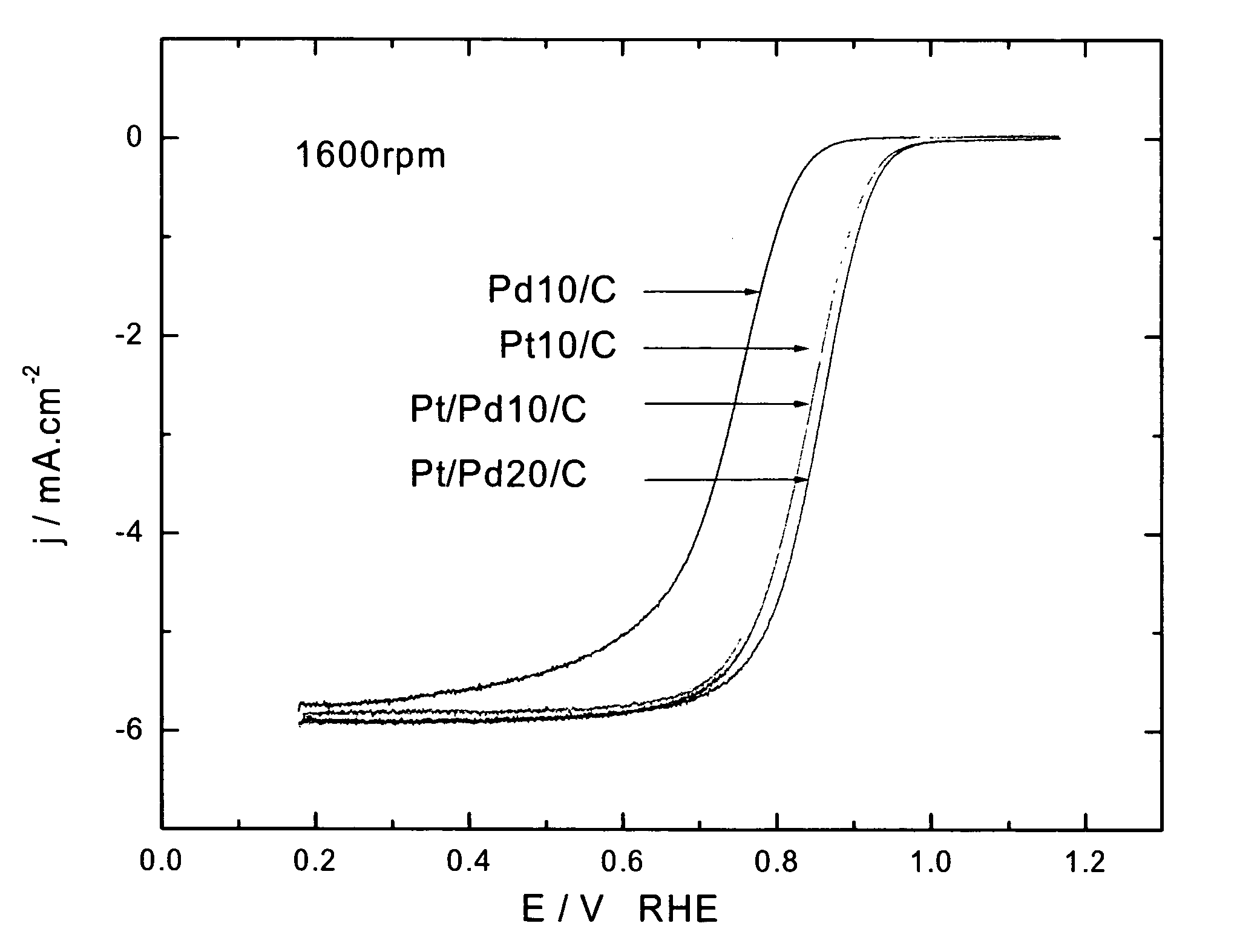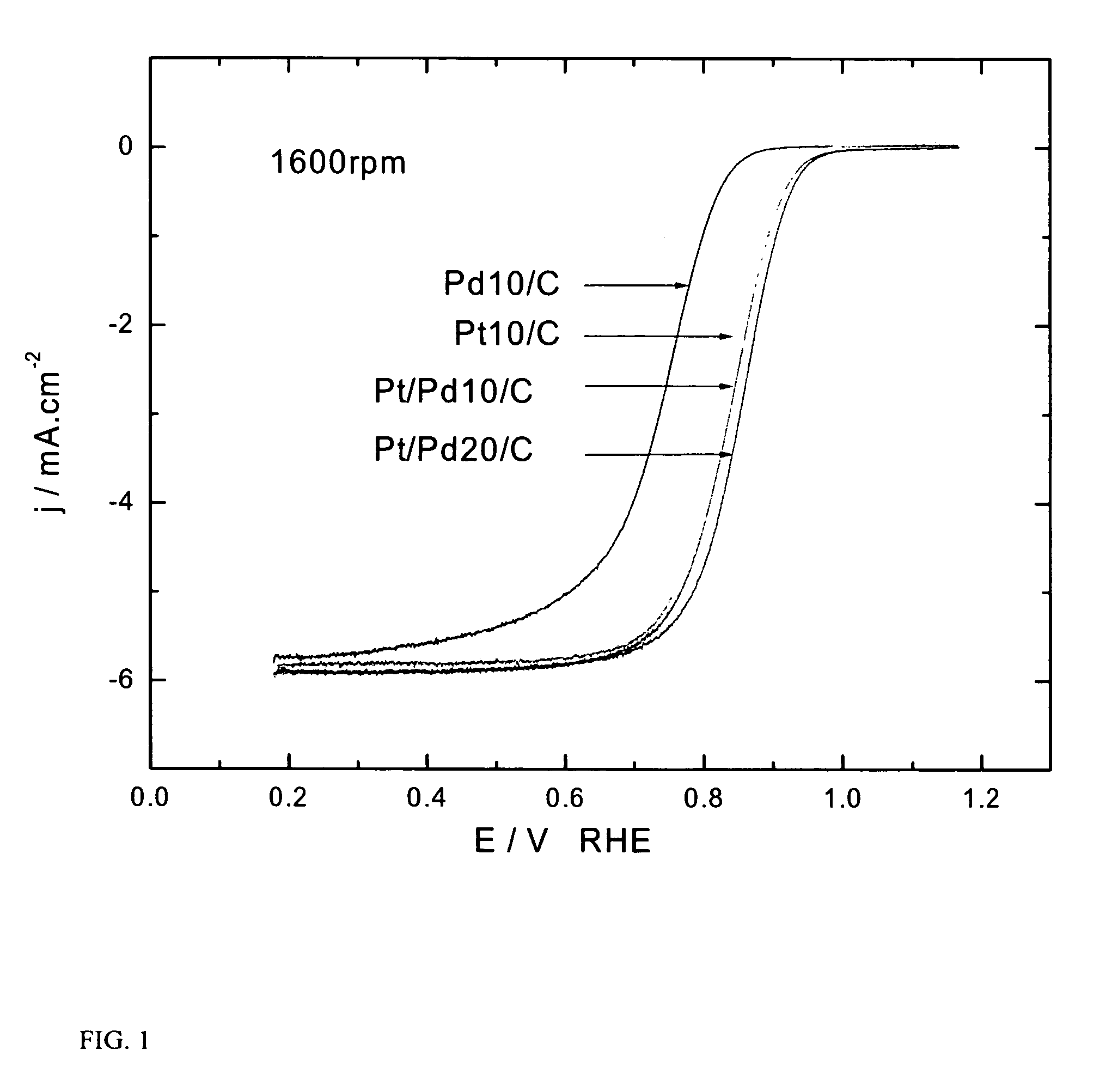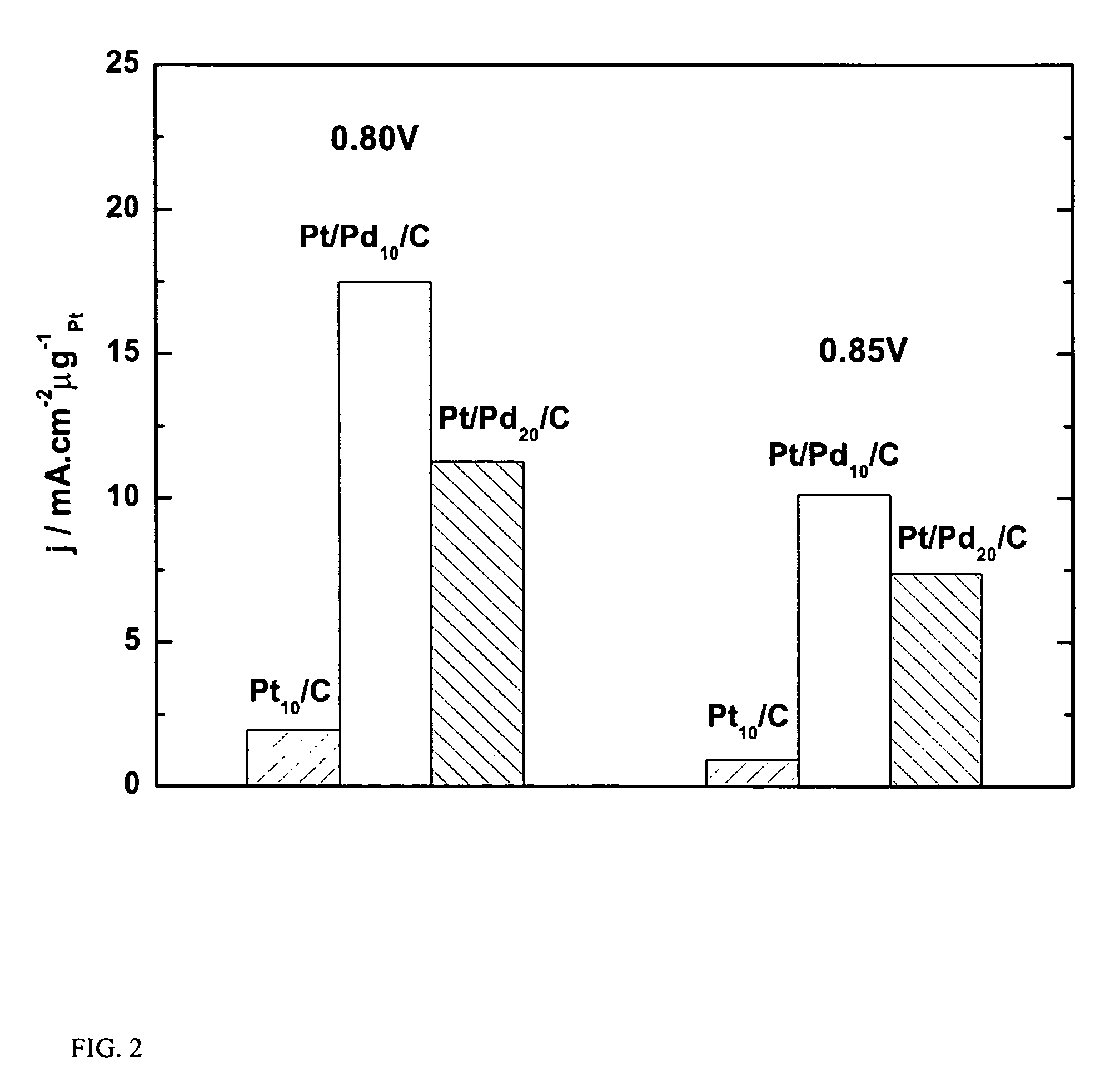Platinum- and platinum alloy-coated palladium and palladium alloy particles and uses thereof
a platinum alloy and alloy coating technology, applied in the field of platinum alloy-coated palladium alloy particles and their use, can solve the problems of large loss of potential 0.3-0.4 volts, slow oxygen reduction kinetics, and limitations of current platinum oxygen-reducing cathodes, and achieve the effect of improving oxygen-reducing catalytic activity and reducing platinum loading
- Summary
- Abstract
- Description
- Claims
- Application Information
AI Technical Summary
Benefits of technology
Problems solved by technology
Method used
Image
Examples
example 1
Preparation of Platinum-Coated Palladium Nanoparticle Composites
[0087]The platinum-coated palladium nanoparticle composites of the present invention were prepared by depositing atomically thin platinum layers on palladium nanoparticles by redox displacement by platinum of an adlayer of an underpotentially deposited (upd) metal on a palladium nanoparticle substrate. In this example, copper was used as the underpotentially deposited metal on a palladium nanoparticle substrate.
[0088]To prepare an electrode with Pd nanoparticles, a dispersion of palladium nanoparticles on carbon substrate (Pd / C) was made by sonicating the Pd / C nanoparticles in water for about 5-10 minutes to make a uniform suspension. The carbon substrate used was Vulcan XC-72. Then, 5 microliters of this suspension was placed on a glassy carbon disk (GC) electrode and dried in air.
[0089]The GC electrode holding the Pd / C nanoparticles was then placed in a 50 mM CuSO4 / 0.10 M H2SO4 solution to electrodeposit copper. After...
example 2
Electrocatalytic Activity Measurements of Platinum Monolayer-Coated Palladium Nanoparticles
[0090]The oxygen reduction electrocatalytic activity of the platinum-coated palladium nanoparticle composites of the present invention (denoted as Pt / Pd) was compared to the electrocatalytic activity of palladium (Pd) and platinum (Pt) nanoparticle catalysts by measuring polarization curves using a rotating disk electrode operating at 1600 rpm (see FIG. 1). In the polarization curve of FIG. 1, Pd 10 / C and Pd 20 / C refer to palladium loading concentrations of 10 nmol and 20 nmol on carbon support, respectively. Pt 10 / C refers to a platinum loading of 10 nmol. The Pd 10 / C curve was measured on palladium nanoparticles of 9 nm size; the Pt 10 / C curve was measured on platinum nanoparticles of 3.1 nm size; the Pt / Pd 10 / C and 20 / C curves were measured on nanoparticle composites of 9 nm size.
[0091]As shown by the polarization curves in FIG. 1, the activity of Pt / Pd 10 / C is much higher than that of Pd 1...
example 3
Electrocatalytic Activity Measurements of Platinum-Iridium and Platinum-Ruthenium Alloy Monolayers on Palladium Nanoparticles
[0094]The oxygen reduction electrocatalytic activity of monolayers of platinum-iridium alloy on palladium nanoparticles having 20 nmol Pd loading, i.e., (Ir0.2Pt0.8)ML / Pd20 / C, was compared to the electrocatalytic activity of monolayers of platinum on palladium nanoparticles having 20 nmol Pd loading, i.e., PtML / Pd20 / C, and to commercial platinum nanoparticle catalysts having 10 nmol Pt loading, i.e., Pt10 / C, by measuring polarizations using a rotating disk electrode operating at 1600 rpm (see FIG. 3). In the polarization curve of FIG. 3, (Ir0.2Pt0.8)ML / Pd20 / C has a half-wave potential 45 mV higher than commercial Pt10 / C, which corresponds to a significantly higher activity than commercial Pt10 / C. In addition, (Ir0.2Pt0.8)ML / Pd20 / C is shown to have a higher activity than PtML / Pd20 / C, as evidenced in its higher polarization of 20 mV as compared to PtML / Pd20 / C. T...
PUM
| Property | Measurement | Unit |
|---|---|---|
| size | aaaaa | aaaaa |
| size | aaaaa | aaaaa |
| size | aaaaa | aaaaa |
Abstract
Description
Claims
Application Information
 Login to View More
Login to View More - R&D
- Intellectual Property
- Life Sciences
- Materials
- Tech Scout
- Unparalleled Data Quality
- Higher Quality Content
- 60% Fewer Hallucinations
Browse by: Latest US Patents, China's latest patents, Technical Efficacy Thesaurus, Application Domain, Technology Topic, Popular Technical Reports.
© 2025 PatSnap. All rights reserved.Legal|Privacy policy|Modern Slavery Act Transparency Statement|Sitemap|About US| Contact US: help@patsnap.com



